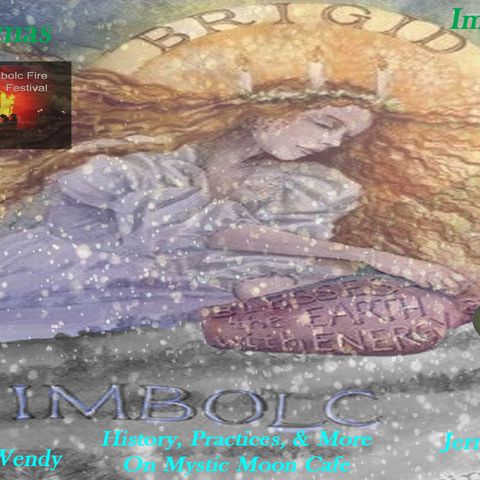Imbolc History, Lore and Crafts

Descarga y escucha en cualquier lugar
Descarga tus episodios favoritos y disfrútalos, ¡dondequiera que estés! Regístrate o inicia sesión ahora para acceder a la escucha sin conexión.
Descripción
This one is best watched on our YouTube channel as there are a lot of visuals, https://youtu.be/SCn7aHQHtT8 Jerri and Wendy put together a little Imbolc history, practices, and crafts! You...
mostra másJerri and Wendy put together a little Imbolc history, practices, and crafts!
You can catch the video right here on our Facebook page: https://www.facebook.com/MysticMoonCafe
Imbolc or Imbolg ([ɪˈmˠɔlˠɡ]), also called (Saint) Brigid's Day (Irish: Lá Fhéile Bríde, Scottish Gaelic: Là Fhèill Brìghde, Manx: Laa'l Breeshey), is a Gaelic traditional festival marking the beginning of spring. It was traditionally held on 1 February. It lands about halfway between the winter solstice and the spring equinox.
Historically, it was widely observed throughout Ireland, Scotland and the Isle of Man. It is one of the four Gaelic seasonal festivals—along with Beltane, Lughnasadh and Samhain. For Christians, especially in Ireland, it is the feast day of Saint Brigid.
Imbolc is mentioned in early Irish literature, and there is evidence suggesting it was also an important date in ancient times. It is believed that Imbolc was originally a pagan festival associated with the goddess Brigid, and that it was Christianized as a festival of Saint Brigid, who is thought to be a Christianization of the goddess. On Imbolc/St Brigid's Day, Brigid's crosses were made and a doll-like figure of Brigid (a Brídeóg) would be paraded from house-to-house by girls, sometimes accompanied by 'strawboys'. Brigid was said to visit one's home at Imbolc. To receive her blessings, people would make a bed for Brigid and leave her food and drink, and items of clothing would be left outside for her to bless. Brigid was also invoked to protect homes and livestock. Special feasts were had, holy wells were visited, and it was a time for divination.
Although many of its customs died out in the 20th century, it is still observed and in some places it has been revived as a cultural event. Since the latter 20th century, Celtic neopagans and Wiccans have observed Imbolc as a religious holiday.
(From Wikipedia)
The video recording will go on our YouTube channel, podcast platform, and our website shortly after the 'Live' broadcast..
Links for listening and/or watching the recording:
https://www.youtube.com/c/MysticMoonCafe
Website:
https://www.mysticmooncafe.com/
Mystic Moon Café hosts bring a variety of guests to talk about paranormal phenomenon, cryptozoology, ghost hunting, favorite authors on many topics - fiction, conspiracy theory, and fact, featured music artists, and more!
MysticMoonCafe@gmail.com
Información
| Autor | Mystic Moon Radio Network |
| Organización | Mystic Moon Radio Network |
| Página web | - |
| Etiquetas |
Copyright 2024 - Spreaker Inc. an iHeartMedia Company
